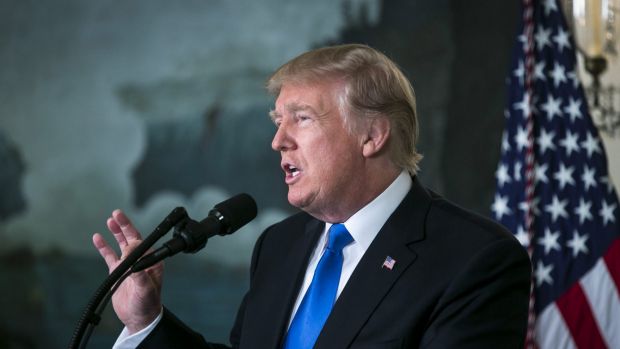IN THE MEDIA
On Iran, Donald Trump has actually got something right
October 22, 2017 | Colin Rubenstein

Colin Rubenstein
The Age, October 22 2017
US President Donald Trump’s “decertification” of the Iran nuclear deal has been the subject of much debate this past week.
Trump’s tendency to be impulsive and his antagonistic style have led some commentators to dismiss the merits of this particular decision without examining the details.
But to do so betrays a lack of understanding of the nuclear deal (known as the Joint Comprehensive Plan of Action, or JCPOA) itself, the flawed limits it places on Iran and the adequacy of how it is actually being verified.
The reality is Trump is not being reckless with regard to Iran. However, his predecessor, Barack Obama, was.
Desperate for a foreign policy legacy, Obama disregarded his own promises and America’s traditional Middle East allies as he bent over backwards in gifting concessions to the Iranian regime during negotiations in 2015. The result was a deal that does not dismantle Iran’s nuclear program; it merely temporarily limits and delays it.
The deal’s “sunset clauses” lift restrictions after 10 years, after which Iran will be free to resume its nuclear program in full. The deal also doesn’t address Iran’s ballistic missile program, a key part of any nuclear weapons system. Furthermore, military sites where much of Iran’s nuclear research on bomb designs are thought to take place are effectively exempted from inspection, while Iran is allowed to continue working on advanced centrifuges which will vastly speed up its ability to make a bomb when it is ready to do so. Finally, the deal says nothing about Iran’s support for terrorism or its belligerent behaviour in the region.
Obama hoped that a tentative welcome back into the community of responsible nations might be the impetus for Iran to start behaving like one. This simply has not happened.
Iran continues to arm and train Houthi rebels in Yemen in addition to spending hundreds of millions of dollars on militias in Syria, where it is an ally of the murderous Assad regime, and in Iraq. Fresh with the estimated US$100 billion in funds freed up by sanctions relief tied to the nuclear deal, it has also increased its annual investment in the proscribed terror groups Hezbollah and Hamas to US$830 million and up to US$70 million respectively.
This is while it continues to threaten to wipe Israel, a sovereign UN-member nation, off the map, successfully works at carving a land corridor to the Mediterranean via Iraq, Syria and Lebanon, and increases its efforts to become the regional hegemon. Additionally, and in violation of United Nations Security Council Resolution 2231, Iran has continued to test ballistic missiles capable of carrying nuclear warheads.
Supporters of the Iran deal argue that the regime is seemingly complying with its terms. However it is impossible to determine this conclusively as Iran’s military sites are off limits to International Atomic Energy Agency (IAEA) inspectors.
Nor is it true, as defenders of the deal maintain, that the IAEA has certified that Iran is in compliance – IAEA head Yukiya Amano recently said his agency has been unable to verify Iran’s compliance with Section T of the 2015 nuclear deal, which prohibits activities that could contribute to the development of a nuclear explosive device.
In any event, Iran can still become a nuclear power within little more than a decade even if it is complying.
One only needs to look at North Korea to see an example of a rogue nuclear aspirant that has risen to prominence under the watch of the international community. It gets worse – Iran and North Korea’s nuclear programs don’t merely share similarities but bona fide links, involving cooperating on both missile and nuclear weapons development.
It is important to note that Trump’s decision doesn’t mean America plans to walk away from the deal altogether. Rather, it presents an opportunity for Congress and the Europeans to attempt to strengthen certain parts of it, for instance verifying Iran’s compliance, altering the “sunset clauses” and introducing prohibitions on ballistic missile activities, enforced by the threat or reality of new sanctions.
It won’t be easy. As it is, Washington is generally divided on partisan lines in regard to the deal, and then there are the other nations party to the JCPOA (Russia, France, China, Britain and Germany) that will need to be convinced.
There are indeed risks associated with going down this path with no assurances as to the outcome. But the outcome from the alternative path – doing nothing – is both assured and gravely concerning. As soon as the “sunset clause” in the deal expires, an exponentially emboldened and rogue Iran will be a nuclear threshold state free to pursue its dangerous ambitions with impunity.
The mathematics is simple: With the deal left alone, Iran – a rogue, belligerent state controlled by a genocidal regime – will, almost without a shadow of a doubt, develop nuclear weapons.
Any considered attempt at altering that disastrous outcome must be pursued.
Doctor Colin Rubenstein AM is executive director of the Australia/Israel & Jewish Affairs Council. Previously, he taught Middle East politics at Monash University.
Tags: International Security, Iran, JCPOA





